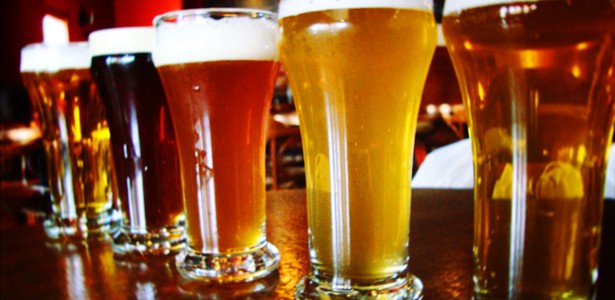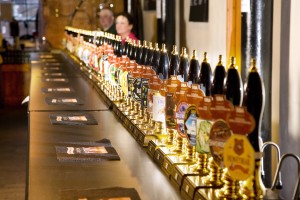What is a Craft Beer? My thoughts
I’ve seen countless blog posts and definitions about the true meaning of craft beer over the last few months – a term that is frequently banded about by many including myself.
It seems to be something that everyone wants to debate and some people have really strong and valid opinions on this subject – perhaps due to the term having recently found its way over here from the other side of the pond.
The problem is in the US there is a clear definition, whereas over here in the UK there isn’t – so whereas most of us seem to interpret it in a similar way – others may not – and hence there will always be a clash and general confusion.
The US definition can be found on the Brewers Association web site (located here) – and is as follows:
An American craft brewer is small, independent and traditional.
Small: Annual production of 6 million barrels of beer or less. Beer production is attributed to a brewer according to the rules of alternating proprietorships. Flavored malt beverages are not considered beer for purposes of this definition.
Independent: Less than 25% of the craft brewery is owned or controlled (or equivalent economic interest) by an alcoholic beverage industry member who is not themselves a craft brewer.
Traditional: A brewer who has either an all malt flagship (the beer which represents the greatest volume among that brewers brands) or has at least 50% of its volume in either all malt beers or in beers which use adjuncts to enhance rather than lighten flavor.
The following are some concepts related to craft beer and craft brewers:
- Craft brewers are small brewers.
- The hallmark of craft beer and craft brewers is innovation. Craft brewers interpret historic styles with unique twists and develop new styles that have no precedent.
- Craft beer is generally made with traditional ingredients like malted barley; interesting and sometimes non-traditional ingredients are often added for distinctiveness.
- Craft brewers tend to be very involved in their communities through philanthropy, product donations, volunteerism, and sponsorship of events.
- Craft brewers have distinctive, individualistic approaches to connecting with their customers.
- Craft brewers maintain integrity by what they brew and their general independence, free from a substantial interest by a non-craft brewer.
- The majority of Americans live within 10 miles of a craft brewer.
For me it’s really quite simple – for a beer to be considered a “craft beer” it has to have been created with the following:
- the best and most appropriate quality ingredients – and even here we should not simply dismiss beers made with adjuncts as they aren’t always added to just cut costs – they can also be added to create an additional feature, such as better foam retention, flavour or for nutritional value
- skill and passion – yes not something tangible here – but if you visit a brewery you’ll know if the Master Brewer is passionate and involved in the decision making and creation of the beers
- great taste – if the beer tastes good – then the brewery – no matter what size and location – has probably done something worthy of the “craft” label. Again this is often down to personal taste!
- integrity – doing the right thing for the beer and not taking shortcuts
In America a large brewery can’t create a “craft” beer and this seems wrong to me. A large brewery can definitely produce a real quality beer, and equally a nano and micro brewery can produce horrendous undrinkable muck. Beers created by Pilsner Urquell, Leffe and Duvel – are created in vast complexes – but the beers are great and very consistent (which for me is a plus). Equally breweries like Brew Dog, Meantime and Sharp’s are starting to move into the big boys territory – well bigger than micro – now does that mean their beers eventually stop being well crafted “craft” beers?
If the word “craft” is too vague and not well defined is that wrong? Does it really cause a major headache for all involved?
If so, perhaps we should be looking at a different term to help describe a beer that has above average qualities and characteristics – but really, what are the alternatives? Artisan, Innovative, Micro-brewed New Wave, Super-Hoppy, Experimental, American-Influenced – these all seem to represent too small a subset which eventually feed back into the Craft bucket.
So I personally just keep coming back to Craft – because ultimately a master brewer who knows his craft will produce a good beer using the tools available to him – whether that be a home-brew setup, a micro brewery or huge factory brewery – and whether it’s delivered in a Cask, Keg, Bottle or now more frequently a Can.
And there appear to be many top beer writers and brewers that share similar views to me. Alex Troncoso, now the head brewer at Camden Town Brewery recently made the following statement on the subject:
“It’s also about quality – by which I don’t mean crazy flavours, but something really balanced and well made. A brewery where everything is precise and organised. Whatever happens in the warehouse, the beer is going to taste great – not a great batch here, a bad batch there.”
Again Peter Brown one of our best beer writers recently stated the following in a blog post:
And Mark Dredge – the author of Craft Beer World (a book which I love browsing – that has facts on 350 craft beers – some from large breweries), states the following in a recent blog on his site:
However, before I sign off on this subject – with my thinking that everyone should chill out and just accept the generic qualities of the term “Craft” – there are those (whose opinions I value) who still seem to think the US definition should be applied and considered.
For example, Garrett Oliver, head brewer at the Brooklyn Brewery in New York and editor of The Oxford Companion to Beer claims:
“It does imply that you are talking about a relatively small and independent brewery. That stipulation has been part and parcel of the whole movement … up until now, the only people who were really interested in making these beers were us (smaller, independent breweries).”
Oliver strongly believes there is a human aspect to craft beer that the bigger, multinational brewers can never emulate.
“The difference with craft beer is that when you’re talking about a brewery, you know whose beer that is. It’s a very personal thing.”
And with those words – we are back at the beginning again, with no clear outcome on the definition of Craft beer!
So I do really feel a UK definition is needed – and if I was to come up with a strong and less vague definition I think I would use and always refer to Dan Shelton’s 5 point definition of what a craft beer is:
- Ingredients – does the brewer seek the best possible ingredients or is s/he more concerned about keeping costs down?
- Methods and equipment – the brewery’s intent – does the brewery do everything it can to maintain quality or does it let things slip as it grows? Is the brewery making the best beer it can?
- The brewer’s spirit – hard to measure, but does the beer reflect the brewer’s personality or is it simply generic and lacking in faults? Are they just following the market, or trying to do something special?
- Company structure – who’s calling the shots? It’s not necessarily about company size, but does the brewer decide what beers are brewed or does the marketing department?
- Control – is the brewer able to exercise some control over how the beer turns out or is s/he simply throwing in ingredients and hoping for the best?
This debate will go on for a long while yet – but in my mind I know what a craft beer is – and I will continue using the term until something better comes along.
Out of interest can anyone actually remember what we called Craft Beer over here in the UK before the term came over from the states? Now that I would be interested in…



Comments are closed.